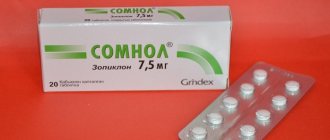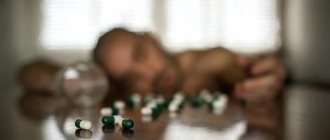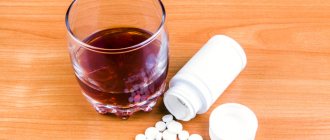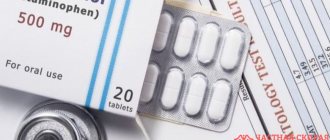Home>Articles> Should you take aspirin for a hangover?
quick menu (hide)
- Features of drugs when interacting with alcohol
- Properties of aspirin
- Aspirin after a hangover
- Effect of the drug on the body
- How much aspirin to take for a hangover?
- Contraindications
- Rules for taking medications
- Benefit or harm
- conclusions
Most of the world's population drinks alcohol. Depending on the characteristics of the body and the dose of alcohol received, the effect of aspirin on the human body can manifest itself in different ways. In relation to the indicators of the drug and the amount of alcohol consumed, it is worth considering several factors that can both harm and improve the condition. To determine the maximum dose and level of effectiveness of the medication, you must consult with your doctor in advance, who will determine the permissible dose for a more effective effect. Thus, before taking aspirin for a hangover, there are several factors to consider to avoid unwanted reactions.
Features of drugs when interacting with alcohol
In home medicine cabinets you can sometimes find many medications that are applicable in certain cases. But there are a number of pharmaceutical substances that are strictly incompatible with alcohol and alcoholic products. The main drugs not recommended for use in such cases are divided into groups:
- sleeping pills group of drugs;
- antidepressants;
- tranquilizers;
- antipyretic group based on paracetamol;
- analgesics;
- painkillers.
note
Medicines containing acetylsalicylic acid are not recommended due to possible internal bleeding. They arise from the interaction of gastric juice, alcohol and drug substances. As a result, the reaction can significantly damage the mucous membranes of the gastrointestinal tract and aggravate the condition of erosions, if any.
The main criterion in selecting a remedy that helps with a hangover is the composition and form of action of the drug. Therefore, no matter what pharmacological group the medicine belongs to, in the presence of ulcers and lesions of the stomach this is an unacceptable mistake. For those who do not suffer from such gastrointestinal diseases, there is a high risk of erosive spots appearing as a result of the interaction of acids.
Description of the drug ASPIRIN
When used simultaneously, antacids containing magnesium and/or aluminum hydroxide slow down and reduce the absorption of acetylsalicylic acid.
With the simultaneous use of calcium channel blockers, drugs that limit the intake of calcium or increase the excretion of calcium from the body, the risk of bleeding increases.
When used simultaneously with acetylsalicylic acid, the effect of heparin and indirect anticoagulants, hypoglycemic agents, sulfonylurea derivatives, insulins, methotrexate, phenytoin, and valproic acid is enhanced.
When used simultaneously with GCS, the risk of ulcerogenic effects and gastrointestinal bleeding increases.
With simultaneous use, the effectiveness of diuretics (spironolactone, furosemide) decreases.
With the simultaneous use of other NSAIDs, the risk of side effects increases. Acetylsalicylic acid may reduce plasma concentrations of indomethacin and piroxicam.
When used simultaneously with gold preparations, acetylsalicylic acid can induce liver damage.
With simultaneous use, the effectiveness of uricosuric drugs (including probenecid, sulfinpyrazone, benzbromarone) is reduced.
With the simultaneous use of acetylsalicylic acid and sodium alendronate, severe esophagitis may develop.
With simultaneous use of griseofulvin, the absorption of acetylsalicylic acid may be impaired.
A case of spontaneous hemorrhage into the iris was described when taking Ginkgo biloba extract during long-term use of acetylsalicylic acid at a dose of 325 mg/day. It is believed that this may be due to an additive inhibitory effect on platelet aggregation.
With simultaneous use of dipyridamole, an increase in Cmax of salicylate in blood plasma and AUC is possible.
When used simultaneously with acetylsalicylic acid, the concentrations of digoxin, barbiturates and lithium salts in the blood plasma increase.
With the simultaneous use of salicylates in high doses with carbonic anhydrase inhibitors, salicylate intoxication is possible.
Acetylsalicylic acid in doses less than 300 mg/day has a minor effect on the effectiveness of captopril and enalapril. When using acetylsalicylic acid in high doses, the effectiveness of captopril and enalapril may be reduced.
With simultaneous use, caffeine increases the rate of absorption, plasma concentration and bioavailability of acetylsalicylic acid.
With simultaneous use, metoprolol may increase the Cmax of salicylate in the blood plasma.
When using pentazocine against the background of long-term use of acetylsalicylic acid in high doses, there is a risk of developing severe adverse reactions from the kidneys.
With simultaneous use, phenylbutazone reduces uricosuria caused by acetylsalicylic acid.
With simultaneous use, ethanol may enhance the effect of acetylsalicylic acid on the gastrointestinal tract.
Properties of aspirin
The main reason for using aspirin after a hangover is to try to alleviate a person’s condition, which is aggravated after drinking too much alcohol. The anti-hangover pill aspirin can improve the condition, restore physical activity and relieve headaches. The effect of aspirin is to instantly affect the composition of the blood, which has a viscous form after drinking alcohol. It thins the blood, prevents the formation of clots and blood clots, stimulates blood flow and alleviates the general condition of a person. Aspirin promotes and restores processes in the body, relieves dehydration and weakness.
If you feel dizzy
If dizziness or weakness suddenly arises, first of all you need to measure your blood pressure. Weakness and headache can mean both an increase and a decrease.
If it is below normal, you need to go into the shade, sit down or lie down, raise your legs so that the blood from them flows to your head. In general, this situation is not very dangerous, unless there is atherosclerotic damage to the carotid arteries (in which case an ischemic stroke is possible), but patients usually know about it. For everyone else, simply drinking hot tea with sugar is enough to make them feel better. Good varieties of strong tea have more caffeine than coffee.
But if your blood pressure has increased, you need to take medication.
Aspirin after a hangover
To achieve optimal results, you must follow the instructions, which indicate the algorithm for taking the drug and its dosage. Taking pills in random order is unacceptable, so it is important to remember the harmful effects of the elements of the drug on the body.
- Before use, you must read the instructions and the permissible dose.
- For an effective effect, the drug is taken a couple of hours before the feast and 6 hours after it.
- People with ulcerative lesions of the walls of the gastrointestinal tract or with metabolic peculiarities should consult a doctor before use.
- Aspirin is taken in moderation, so regular use of the drug is prohibited for “alcoholics” and people who frequently drink alcohol.
Effect of the drug on the body
Given the controversial effectiveness of aspirin, it is important to remember that the determining role is played by the person’s condition, the characteristics of his body and the presence of any internal injuries and diseases. The illusory effectiveness of this medicine for such people can result in irreversible processes that can lead to death. The main positive aspects when taking medications of different pharmacological groups:
- improving blood circulation and providing oxygen to cellular structures;
- aspirin relieves any manifestations of pain and inflammatory processes;
- thins the blood and stimulates free circulation;
- reduces blood pressure;
- Acetylsalicylic acid does not cure, but alleviates the human condition.
Objective use of the drug is achieved thanks to the correct sequence and dosage, which was established by the attending physician. Many people take the pill the day before the upcoming feast. This allows you to significantly reduce the impact of alcohol on the body, prevent the appearance of hangover symptoms and provide yourself with a “morning without consequences.”
After some time has passed during the pandemic, it is already known that most cases of coronavirus infection (COVID-19) are asymptomatic, but some patients develop severe symptoms and the disease becomes life-threatening. The hallmarks of coronavirus infection are pneumonia and acute respiratory distress syndrome (ARDS). Approximately 25-42% of patients develop thrombotic complications, which are associated with increased mortality. Not only deep vein thrombosis of the lower extremities, but also arterial thrombosis are relatively common. In autopsies of COVID-19 patients, blood clots with high levels of megakaryocytes and platelets were observed in the heart, lungs and kidneys. There are specific changes in the hemostasiogram indicating hypercoagulation. Microthrombosis of the capillaries of the alveoli was also observed, the frequency of which was significantly higher than in patients with influenza. It is assumed that thrombosis contributes to the severe lung damage and hypoxemia that occurs in patients with COVID-19.
The studies to date suggest that systemic antithrombotic therapy reduces mortality in mechanically ventilated patients with COVID-19. Low-dose aspirin has long been used to prevent stroke and myocardial infarction in patients at risk and is often taken by adults at increased risk of cardiovascular complications. But, on the one hand, aspirin reduces the incidence of cardiovascular complications, and on the other hand, as a recent study and meta-analysis found, it also increases the risk of bleeding. In turn, the use of aspirin in ARDS has also shown conflicting results: a beneficial effect was found in some studies, but not in others.
The advantages of aspirin: wide availability, its low price, numerous studies indicating its effectiveness and safety in patients with cardiovascular diseases. With this in mind, a study was conducted in which the authors examined data on the effect of aspirin on clinical outcomes in patients hospitalized with COVID-19. The primary objective of the study was to determine whether taking aspirin would affect the rate of mechanical ventilation. In addition, the authors examined the association of aspirin use with a reduced risk of ICU transfer and in-hospital mortality.
To conduct the study discussed, information on patients with COVID-19 hospitalized between March and July 2021 was extracted from the multicenter CRUSH COVID Project database. Four hospitals participated in the study: University of Maryland Medical Center, Wake Forest University Baptist Medical Center, Northeast Georgia Health Services Hospital, and George Washington University Hospital. Data entry for all patients was done through the research electronic data capture system REDCap4. Prescribing aspirin within 24 hours of hospitalization or 7 days before admission to the clinic was considered to be taking it. Why was this definition chosen as a basis? It's all about the long-lasting action of aspirin as an irreversible platelet inhibitor and the speed of onset of its action. If aspirin was prescribed after the start of mechanical ventilation, the patient was assigned to the “non-aspirin” group. Thus, the study included 412 patients.
The need for invasive mechanical ventilation, including ventilation with an endotracheal or tracheostomy tube, was the main parameter of this study. Non-invasive ventilation was excluded. Secondary outcomes included transfer to the intensive care unit and in-hospital mortality.
Based on the results of the study discussed, the use of aspirin showed an independent association with a reduction in the risk of mechanical ventilation, transfer to the ICU, and hospital mortality. The results are clinically significant regarding the ability to avoid mechanical ventilation in patients with COVID-19.
Regarding the mechanisms of action of aspirin, it can be assumed that since COVID-19 is associated with hypercoagulability and pulmonary microthrombosis, aspirin may reduce these effects. This drug is cheap, available and has a well-described risk profile. These qualities of aspirin, combined with experimental data, support its role as a potential adjuvant therapeutic agent for the novel coronavirus infection. However, it is important to remember that the study is preliminary and the authors believe that before randomized clinical trials are conducted on this issue, it is strongly recommended that the risks of taking aspirin be carefully weighed against its potential benefits for patients with COVID-19.
How much aspirin to take for a hangover?
The drug must be taken according to the instructions included with any pharmaceutical product or as prescribed by a doctor. Experts recommend taking 0.3-0.5 g the day before the upcoming holiday. The medication should be taken again after 10-12 hours in the optimal amount of 0.5 g. Doctors recommend combining the medication with a diet that minimizes the content of white products. This will help reduce the load on the liver and relieve the feeling of heaviness. Before taking the drug, you must familiarize yourself with all possible contraindications indicated in the instructions.
Contraindications
Determining the effect of aspirin in certain cases is often difficult. Diseases in which the action of aspirin causes negative processes:
- gastrointestinal diseases;
- erosion and damage to the walls of the stomach;
- allergy;
- disorders of the kidneys and liver;
- chronic liver disease;
- asthma;
- chronic diseases of the cardiovascular system.
This group also includes persons with intolerance to the ingredients of the drug, undergoing hemodialysis and other courses of treatment using any medications.
Rules for taking medications
The symptoms of a hangover hinder a person’s functionality and put him in a state of weakness and malaise. The benefit of the drug will be optimal if it is taken correctly in accordance with the parameters established by the attending physician or with the specified recommendations in the instructions.
- It is unacceptable to swallow the tablet without liquid.
- Pills or effervescent powder must be diluted with a certain amount of water.
- It is strictly forbidden to take the tablet with alcohol, beer, tea or juice.
- You should not take the pill right before going to bed.
- It is good to take the powder in the morning, as this will determine the condition of the body for the whole day without causing harm.
The effect of the drug on the body has a different period. According to the indicated properties of aspirin, it begins to act within 10-20 minutes. If the effect does not occur, do not quickly swallow an additional tablet to improve the result. The recommended waiting time for the drug to act is indicated in the permissible probability and the approximate relationship between the properties of the drug and the body. Therefore, these dates are not reliable. It all depends on the person, the amount of alcohol and many other factors that slow down the body’s recovery process.
Benefit or harm
No special preparation or effort is required to take the drug. Many are accustomed to simply drinking an effective remedy, like everyone else, and hoping for optimal results. However, the characteristics of the body and its reaction to taking any medications do not have common features. In certain cases, the dosage, composition and form of tablets are established solely taking into account all factors of the body’s functioning. Therefore, the obviously false concept of universal benefit cannot be regarded as adequate. The benefits of taking aspirin will be received by those who take it responsibly and according to all the rules and recommendations. They will help avoid complications, unforeseen situations and bleeding only if used correctly and rationally.
How do you know that the benefits outweigh the harm?
The doctor, with your help, will collect and analyze many factors and then make a decision. You yourself can try to assess your risks using an online calculator developed by American cardiologists.
Remember that arterial hypertension itself is not an indication for prescribing aspirin if the patient does not have a diagnosis of coronary heart or brain disease! On the contrary, poorly controlled, high blood pressure is often a contraindication to the use of aspirin, since sudden increases in blood pressure increase the risk of intracerebral bleeding, and aspirin can significantly increase it.
In addition, aspirin may reduce the effectiveness of some drugs used to treat hypertension, such as enalapril, captopril, lisinopril, perindopril, and beta blockers.
If taking preventative aspirin turns out to be unreasonably dangerous for you, your doctor will suggest other prevention options, such as lifestyle changes or taking statins.
Currently commercially available are predominantly low-dose enteric-coated aspirin tablets. The outer shell “dissolves” only in the small intestine, protecting the stomach from irritation. These tablets must be swallowed whole without chewing.
There are also combination preparations containing the additive magnesium hydroxide. It is believed that magnesium in this combination reduces the harmful effects of acetylsalicylic acid on the mucous membrane of the stomach and intestines.
And don't use aspirin if the tablets smell strongly of vinegar—the medicine has probably gone bad!
In order for aspirin to effectively protect your blood vessels, it is prescribed for daily long-term, usually lifelong use. Most likely, you will not feel any changes in your body after starting treatment - but this does not mean that aspirin does not work!
conclusions
Does aspirin help with hangovers—yes, it does. But for this it is necessary to create optimal conditions for the body and reduce the likelihood of side effects. Aspirin is an almost ideal option, but only in cases of uniform use. In large quantities with regular use, it can cause irreparable consequences that will have to be eliminated with medications that contribute to the emergence of new problems with the gastrointestinal tract. Therefore, it is important to be aware and careful when taking any medications, otherwise you can harm your own body.
Don't get into icy water
There are rules for blood vessels and the heart. When moving from a warm room to the street, where it is cool and windy, there is a high risk of spasm of the coronary vessels (they supply blood to the heart itself). When a person leaves a cool room into the heat, then, on the contrary, vasodilation is possible, and as a result - a decrease in pressure, weakness, and dizziness.
The desire to cool off in water can lead to disaster. It is important to be careful for those who already have problems with the heart and blood vessels. It’s one thing when a person has been pouring cold water for many years - his blood vessels are trained. And it’s completely different if a newcomer starts jumping into a cool pond with him for company. He may have a spasm of coronary vessels and a heart attack, and for him the first time may be the last. Therefore, if you have been lying on the beach for a long time under the hot sun, you should gradually enter the river or sea. And pour yourself over - gradually lowering the temperature of the water. To begin with, you can try water with a temperature of +30°C.











